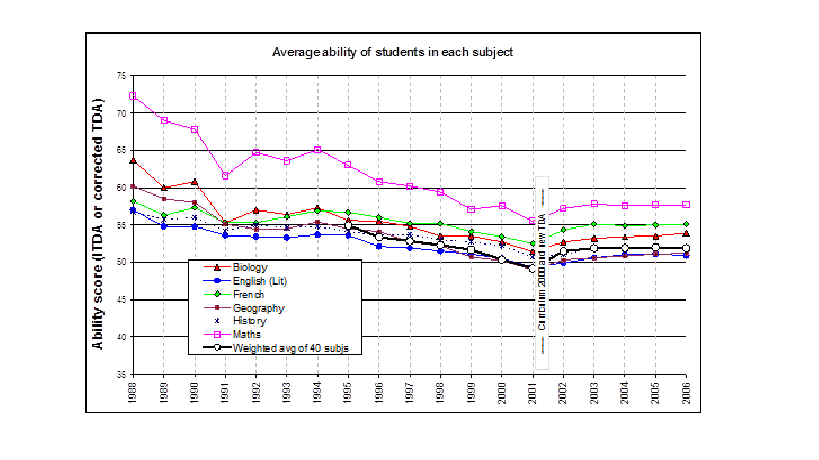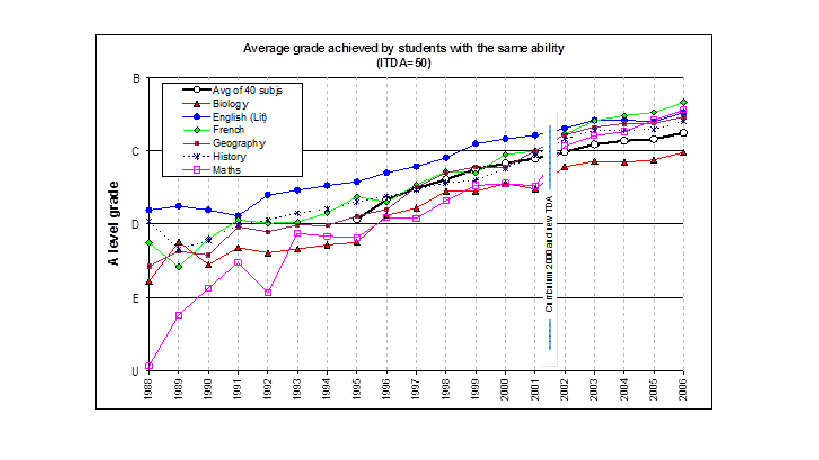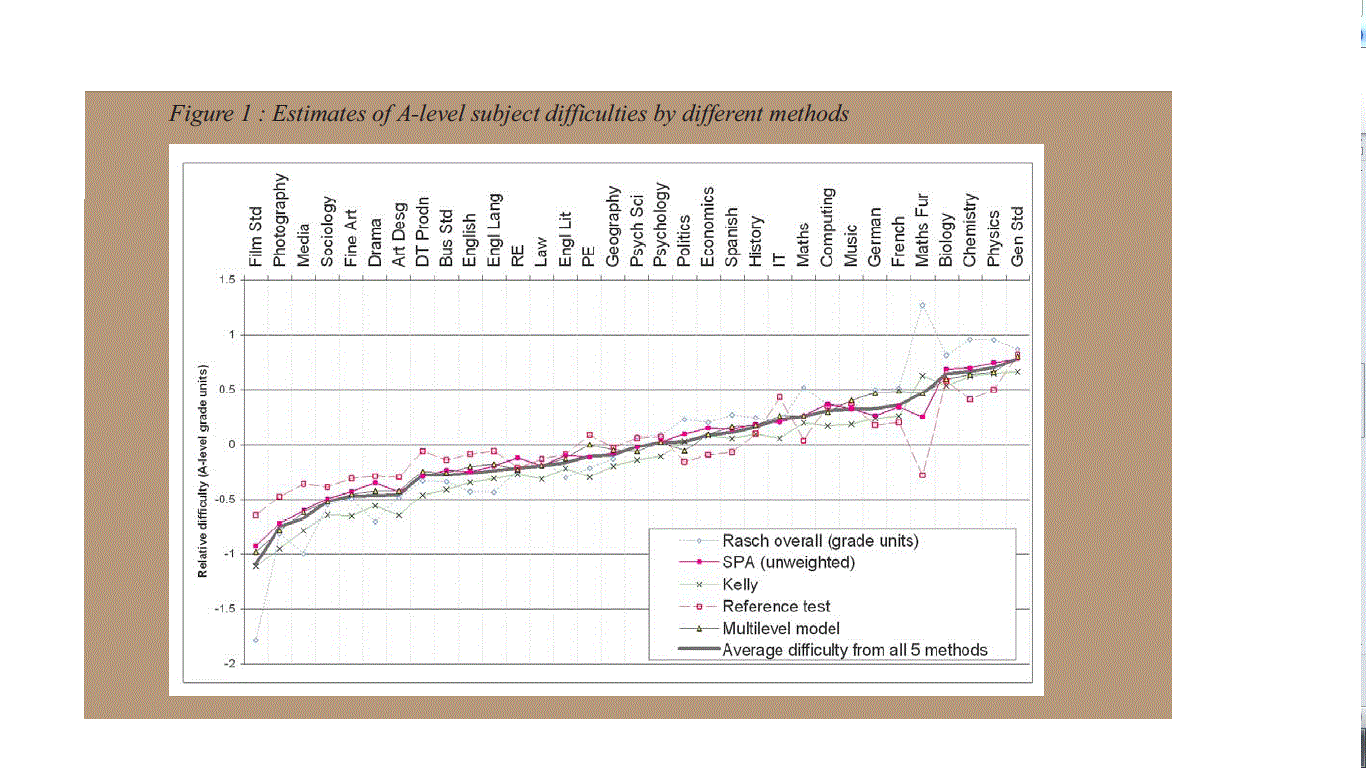
A-level syllabus now. After returning to UK teaching six years ago, after more than a decade overseas my overwhelming impression has been that A-level standards have fallen significantly. I was until recently an A-level examiner and my sense has been that what in the past would have been a high grade O-level pass would now achieve a low grade A-level pass. This is not mere anecdote, there is in fact a body of serious evidence to support this some of which I will outline below. It is this evidence that shows exactly why Michael Gove is right to give leading universities much more control of A level syllabuses.
In 2007 Professor Robert Coe, the Director of the Curriculum, Education and Management (CEM) Centre at Durham University published an analysis for the Office of National Statistics that showed that the standards of cognitive ability tested by A levels had in fact fallen at exactly the same time as the average number of A-level passes had increased.
In fact, his research showed that between 1988 and 2006 for a given level of ability the A-level grade awarded had risen by around two A-level grades i.e. a C grade in 1988 got an A grade in 2006. However, in Mathematics he found that the rise appeared to be 3.5 A level grades i.e. a D grade in 1988 could 18 years later be awarded an A grade.
In October last year Professor Coe published his analysis of 2010 and 2011 A-level and GCSE results, which showed that the same rate of slippage of standards that had happened for the last 20 years was continuing. Professor Coe stated:
"We have seen candidates with the same level of ability awarded A-levels about a tenth of a grade higher every year since 1988. This inflation seems to have continued up to the latest round of results, taken in 2011.”
It must be stressed that Professor Coe is not some maverick researcher, he is director of the CEM Centre at Durham University which produces the ALIS grades used by the overwhelming majority of sixth forms to set target grades for A-level students in different subjects based on past performance of students with similar average GCSE scores.
Not only have A-level standards fallen, but the content has shrunk too. In some subjects this has been due the introduction of what is euphemistically called ‘applied learning’. This has been a particular issue in science subjects, but it also affects others too. So, for example, the A-level Geography course that I teach consists of two exam papers for the AS year – ‘Managing human environments’ and ‘Managing physical environments’. Yet the Physical Geography is actually only about 25% now because half of that paper is devoted to issues such as conflicting land use on the coasts and rivers, managing tourism and oil exploration sustainably in cold environments and deserts etc. What that means is that there is very little time for teaching the actual science – the physical processes of coastal and fluvial geomorphology, glaciation and climatology etc. This is then reflected in the syllabus. For example, even OCR (Oxford, Cambridge and RSA) which has one of the more rigorous syllabuses no longer requires students to understand how tides work in their study of coastal processes. Quite how anyone can be expected to have an adequate understanding of how the coastal environment works without understanding tides is beyond me – I still teach a lesson on tides!
A further issue in the dumbing down of standards has been the modularisation of subjects which has led to a resit culture. In many sixth forms students who have started A-level study in September take one of their two AS exams in the January on the basis that they can, if necessary, then resit the exam in the summer to boost their grade, some may then even resit again the following January to boost their grades still further. The problem is not the idea of AS level exams – taken after the first year of A level study. AS levels are actually the best predictor of final A-level (A2) results and without them universities would have to rely on students’ GCSE results. In order to maintain A-level standards the problem that needs to eliminated is the modularisation of A-levels and the resit culture that it creates.
Another issue relating to increasing A-level grades has been the rise of new A-level subjects. Again, research published by Durham University analysing the cognitive ability tested by different A-level subjects found that some subjects such as Physics were nearly two A-level grades harder than other subjects such as Film Studies.
Research by Policy Exchange found that these ‘soft’ A-level subjects were disproportionately taken by students in the state sector and also found that they seriously disadvantaged students in applying to mid to top rank universities. For example, nationally 13.1% of students take A levels in either Geography, History, Economics or French, but between 20 and 24.5% of students accepted at top universities such Exeter, Durham and St Andrews took these subjects. It is very clear that this area is key to getting more state school students into leading universities, as well as being an issue that needs to be addressed in respect of grade inflation. That is why David Willets was absolutely right to insist a year ago that universities must publish details of the subjects taken by successful applicants.
Both David Willets and Michael Gove are clearly driving forward A-level reform in exactly the direction that it needs to go. However, one further area they should consider to help bring more academic rigour back to A-levels is the timing of AS exams. AS students start their courses in September due to needing to wait for GCSE results and so have little more than two terms study before sitting AS exams, which normally take place in May. However, A2 students normally start their A2 course in June straight after their AS exams, which means that they have almost 3 whole terms and the summer holiday in which to study. There is clearly a strong case to be made for setting AS exams in June and A2 exams in May. This would allow an extra month of teaching before AS exams thereby allowing extra academic rigour to be introduced. It would also potentially allow final A2 results to be also published earlier, which would give more time for universities to select the best applicants for remaining university places through clearing.
Teachers and sixth forms are judged by their A-level results and making them more rigorous is likely to lead initially to a fall in A-level pass rates. This is almost certainly a key reason why some teaching unions have opposed Michael Gove’s reform plan. However, grade inflation is like monetary inflation, it adds no real worth and at the end of the day devalues what people have worked hard for.
Now is not the time to hold back if we want to maintain a world class A level and university system.


 RSS Feed
RSS Feed
